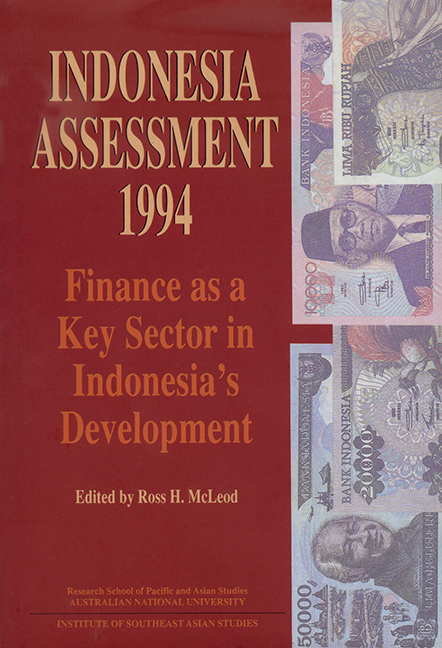Book contents
- Frontmatter
- Contents
- Tables, figures, appendices
- Foreword
- Glossary
- Contributors
- Acknowledgements
- 1 Introduction
- PART A ECONOMIC AND POLITICAL DEVELOPMENTS
- PART B FINANCE AS A KEY SECTOR IN INDONESIA'S DEVELOPMENT
- I The Reform Process
- II Monetary and Exchange Rate Policy
- III Banking Sector Reforms
- 8 Banking sector reforms in Indonesia, 1983-93
- 9 Bank soundness requirements: a central bank perspective
- 10 Bank soundness requirements: a commercial bank perspective
- 11 The case against deposit insurance in Indonesia
- IV Domestic and International Capital Markets
- V Small-scale Finance
- References
- Index
11 - The case against deposit insurance in Indonesia
from III - Banking Sector Reforms
Published online by Cambridge University Press: 21 October 2015
- Frontmatter
- Contents
- Tables, figures, appendices
- Foreword
- Glossary
- Contributors
- Acknowledgements
- 1 Introduction
- PART A ECONOMIC AND POLITICAL DEVELOPMENTS
- PART B FINANCE AS A KEY SECTOR IN INDONESIA'S DEVELOPMENT
- I The Reform Process
- II Monetary and Exchange Rate Policy
- III Banking Sector Reforms
- 8 Banking sector reforms in Indonesia, 1983-93
- 9 Bank soundness requirements: a central bank perspective
- 10 Bank soundness requirements: a commercial bank perspective
- 11 The case against deposit insurance in Indonesia
- IV Domestic and International Capital Markets
- V Small-scale Finance
- References
- Index
Summary
Introduction
The virtual explosion of Indonesia's financial industry since the October 1988 deregulation package (‘Pakto’) has presented a new set of problems to government regulators, who must now manage a highly competitive market without undermining the gains in economic efficiency engendered by market reforms. Perhaps the greatest fear of bank regulators is the simple market dictum that unprofitable firms must fail, because failure of a bank is often viewed as a possible trigger for general bank runs and financial panics. Among other suggestions, government-sponsored deposit insurance schemes are proffered as a preventative measure. As Indonesian regulators have moved towards a more conservative regulatory stance since 1991, a deposit insurance scheme is no doubt a tempting response to the concern that some banks may face insolvency at some tune in the future.
The collapse of Bank Summa (Maclntyre and Sjahrir 1993:12-16) and revocation of its licence by the Finance Minister in December 1992 fuelled a lively public debate on the merits of deposit insurance. However, the Bank Summa crisis also showed that the liquidation of a major private bank need not result in a widespread bank panic, nor in large losses to small savers. Nevertheless, the message to other private banks and to depositors was clear. Owners would not be shielded from the consequences of losses suffered by their banks, and depositors could expect to recover their funds only to the extent that banks’ remaining assets and collateral against bad loans were adequate for the purpose. This message in turn creates a powerful disincentive for private banks to engage in unsound practices, especially to the extent that depositors can monitor them and demand higher compensation or withdraw funds in response to increased risk.
Deposit insurance, by contrast, entails an explicit government guarantee to depositors—and often an implicit guarantee to bank owners—that they will not bear the burden of bank losses, nor, in the case of depositors, earn higher returns for entrusting their savings to riskier banks.
- Type
- Chapter
- Information
- Indonesia Assessment 1994Finance as a Key Sector in Indonesia's Development, pp. 186 - 200Publisher: ISEAS–Yusof Ishak InstitutePrint publication year: 1994



